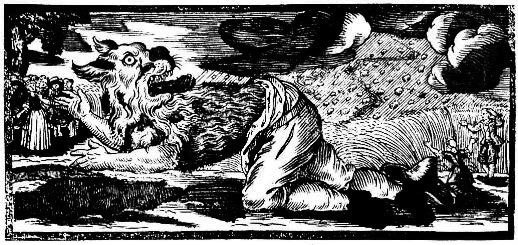Halloween is just around the corner, and you know what that means: overpriced costumes and too much candy. But let’s not forget what it also means: scary stuff! And that’s what we’ll be featuring at Wordnik all month, starting this week with a howler of a theme: werewolf words.
Werewolf comes from the Old English werewulf, with wer meaning “man,” and wulf meaning “wolf.” The Virtual Linguist has an excellent post about the two Old English words for man, were and wapman. While wapman gave us man, “the only vestige of [were] in modern English is the word werewolf.”
Now, were is used to indicate any shapeshifting animal. There’s the weretiger, “a creature of Southeast Asian myth,” and in African myth and folklore, the werehyena. In various myths, fictions, and games, there’s the wererat, the werebear (not to be confused with these bears), the werepanther, and more.
The werewolf is also known as a wolfman and a loup-garou. Loup-garou is French in origin and translates as “wolf man-wolf,” with loup meaning “wolf,” and garou meaning “man-wolf.” The Online Etymology Dictionary explains:
The garou (O.Fr. garoul) is cognate with the garulph, gerulphos in Norman versions of the word, which breaks down to gar/war/wer “man” and ulph/wlf “wolf.” It seems to have been an attempt to wrestle O.H.G. *werawolf or its Frankish equivalent into the Gallic/Romanic sound system of the French tongue. But the French now use garou to mean any kind of were-transformation: chien-garou (changing into a dog) chat-garou, etc.
Loup-garou is a pleonasm, “a phrase in which one or more words are redundant as their meaning is expressed elsewhere in the phrase.”
The rougarou is “a variant pronunciation and spelling” of loup-garou, and “most often is described as a creature with a human body and the head of a wolf or dog.” By the way, cynocephaly is “the state of a human having the head of a dog.”
Another word for werewolf is lycanthrope, which comes from the Greek lykos, “wolf,” plus anthropos, “man.” (In the Underworld film series, Lycans are a race of humans that can transform into “bipedal, humanoid wolf-like creatures.”) Lycanthropy also refers to the delusion that one can change himself into a wolf.
Other similar delusions include zoanthropy (contains the Greek zoion, “animal”), “in which a person believes himself to be one of the lower animals”; cynanthropy (kyon, Greek for “dog”), “in which the afflicted person imagines himself to be a dog, and imitates its voice and actions”; and boanthropy, “in which the victim imagines himself to be an ox,” with boan from the Greek bos, “cow.”
Werewolf syndrome is also known as hypertrichosis, “an abnormally large development of hair either locally or generally over the body.” Hypertrichosis is made up of Greek parts: hyper means “over, beyond, overmuch, above measure”; trikhos means “hair”; and osis, “state of disease.” It differs from hirsutism, which is “excessive and increased hair growth in women in locations where the occurrence of terminal hair normally is minimal or absent.” In the 19th and early 20th centuries, sideshow performers such as Jo-Jo the Dog Faced Boy and Lionel the Lion-Faced Man were most likely afflicted by hypertrichosis.
While a full moon is supposed to be the werewolf catalyst, a silver bullet is supposed to be the only kind of weapon that can bring a werewolf down. The term now also refers to “any straightforward solution perceived to have great effectiveness or bring miraculous results.” For more on the silver bullet metaphor, check out this Language Log post from Mark Liberman, and for all things silver, look here.
Therianthrope refers to “any mythical being which is part human, part animal,” and comes from the Greek therion, “beast,” plus anthropos, “man.” Turnskin is an obsolete term meaning “someone who can change their skin at will, especially into that of a wolf,” and is a direct translation of the Latin versipellis, itself from vertere, “to turn,” and pellis, “skin.”
In Native American legends, shapeshifters are known as skinwalkers, implying walking around in someone else’s skin. In Scottish and Irish legend and folklore, the selkie is “a seal which can magically transform into a human.” The kitsune is “a Japanese fox spirit, normally female, said to have powers such as shape-shifting.” Loki is the Norse god of mischief and trickery, and was said to have shapeshifting abilities. And we can’t forget the animagus, “a wizard who elects to turn into an animal,” as opposed to a werewolf, which, as Hermione Granger reminds us, “has no choice in the matter.”
For even more shapeshifters, check out this list, and this one for more dogs in myth. You’ll like this list for words on transformation, and this one, this one, and this one for words about the moon. Finally, Arnold Zwicky compares three diffferent translations for Der Werewolf, a German poem.
Remember, we’re all things werewolf this week at Wordnik. As for next week, we have just one word.
[Photo: German woodcut 1722, Public Domain]
[Photo: “Moonstruck,” CC BY 2.0 by mikequozl]




